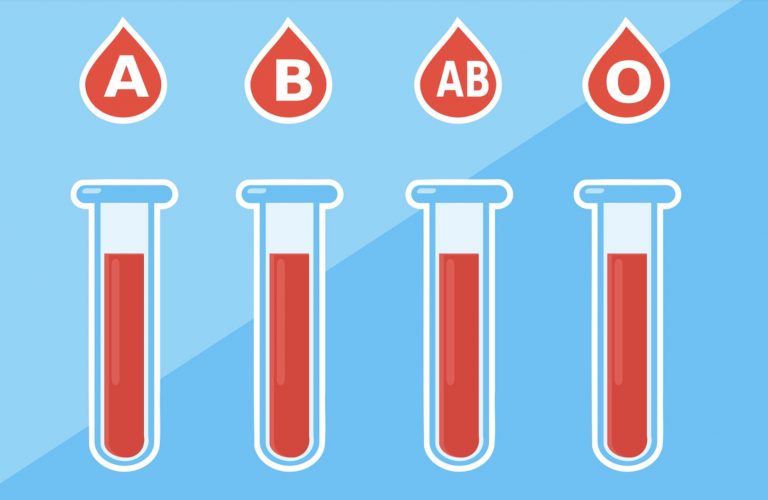A blood type is a categorization of blood based on the presence and absence of antibodies and inherited antigenic substances, which means your blood group is controlled by your parents’ genes.
There are four main blood types, each group being either Rh-Positive D Negative or Rh-Negative D Positive. The total number of blood groups is therefore 8. With help from Express Pharmacy Online, here’s everything you need to know about blood types to make sense of them.
Story Stages
Antibodies and Antigens
Blood is composed primarily of red blood cells, white blood cells, and platelets, all of which are contained in plasma. Platelets are tiny, colorless blood cell fragments that form clots to prevent bleeding.
The antigens and antibodies in your blood determine your blood type – the former being proteins present in plasma, while the latter are protein molecules located on the red blood cell surface. Antibodies are part of our body’s natural defenses, and they alert the immune system when foreign substances, such as germs, are detected so that the immune system can destroy them.
The Four Main Blood Groups
There are four distinct blood group systems established by the ABO system, each with its own set of antigens:
Blood group A – This group has red blood cell antigens that are A, as well as plasma anti-B antibodies.
Blood group B – This category includes B proteins, with anti-A antibodies in the plasma.
Blood group O – This group has both anti-A and anti-B antibodies in its blood, although it does not have any antigens.
Blood group AB – There are three types of wild wheat: “A” and “B,” as well as a fourth type that has both A and B antigens but no antibodies.
The most frequent blood group is blood group O, accounting for one in seven individuals in the United Kingdom.
It’s quite dangerous to get blood from the incorrect ABO group, such as if you have a serious injury or illness. The second reason, as previously stated, is that if a person with group B blood were to receive group A blood, their anti-A antibodies would target the group A cells. Because of this, group A blood must never be given to a person with group B blood, and vice versa. The proteins that identify an individual’s blood group are known as antigens. Because O-group individuals lack A and B antigens, they can receive transfusions from any other group safely.
The RhD System
There may be additional antigens in red blood cells, one of which is the RhD protein. If the protonemata are present, RhD is positive; if they’re absent, RhD is negative. Because of this, you might be one of the following eight blood types:
- B RhD positive (B+)
- B RhD negative (B-)
- RhD positive (O+)
- RhD negative (O-)
- A RhD positive (A+)
- A RhD negative (A-)
- AB RhD positive (AB+)
- AB RhD negative (AB-)
Approximately 85% of the UK population is RhD-positive, with 36% of the population being O+, which is the most frequent type. Because O- blood can, in most circumstances, safely be supplied to anyone, it’s the blood type of choice in situations where the blood group isn’t immediately known. Because it lacks A, B, and RhD antigens on the cell surface and is therefore compatible with every other ABO and RhD blood group, blood group O- is mostly safe for most people.
Giving Blood
We are all capable of donating blood. However, only 1 in 25 individuals currently do so. You may give blood if you meet the following requirements:
- You must be over 50kg (7st 12lb) to participate.
- You’re over 70, and you’ve given blood in the last two years.
- You’re fit and healthy
- You must be 17 to 66 years old (or 70 if you’ve given blood previously)
Testing Blood Groups
Your blood is mixed with various antibody solutions to determine your blood group. Anti-B antibodies will cause clumping if the answer includes anti-B antigens and you have B antigen on your cells (you’re blood group B). Blood group O is the result of the blood does not react to any anti-A or anti-B antibodies. Several tests may be conducted to determine your blood group.
A blood transfusion is when blood is extracted from one individual and given to another. Your blood will be tested against a sample of donor cells that include ABO and RhD antigens. If no response is received, donor blood with the same ABO and RhD types as the recipient’s can be utilized.
Pregnancy
Women who are expecting are typically given a blood group test. The reason for this is that, if the mother is RhD-negative but the father has RhD-positive blood, the untreated disease might lead to problems. It’s critical that RhD-negative women of childbearing age only receive RhD-negative blood.
Knowing your blood type may help you save lives, not only your own. It may also assist you in giving blood by allowing you to give the best possible aid to those in need. As you can see, there are several elements that may influence your blood type.
